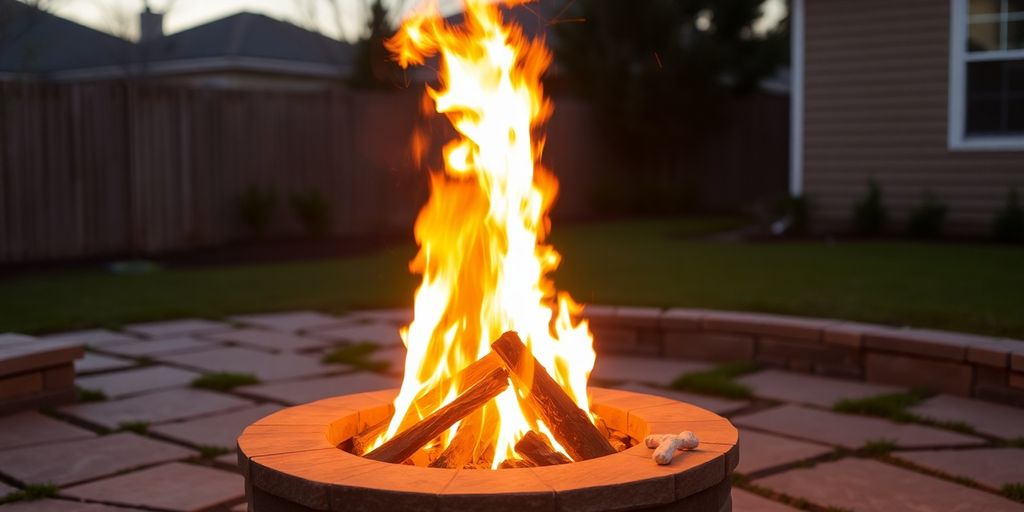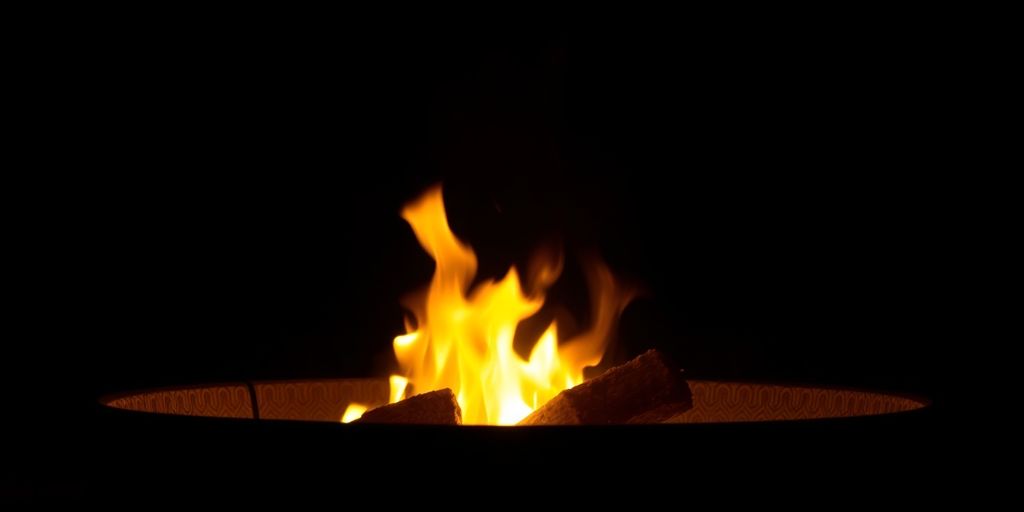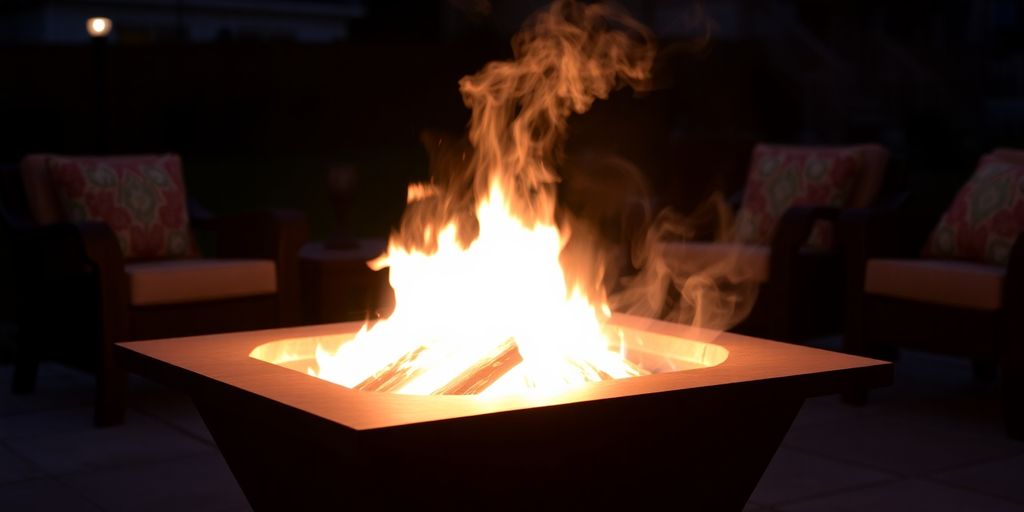Thinking about getting an outdoor fire pit Ottawa for your backyard? It’s a great way to enjoy those cooler evenings, but before you start building or buying, you really need to know what the city’s rules are. Ottawa has specific bylaws in place to make sure everyone stays safe and nobody causes a problem. We’ll break down what you need to know about these regulations, from permits to safe practices, so you can enjoy your fire pit without any worries.
Key Takeaways
- You generally need a permit for open-air fires, but propane, natural gas, or ethanol fire pits don’t require one.
- Always check the city’s website or contact the Fire Service Department to see if a fire ban is in effect before lighting any fire.
- Fire pits must be kept a safe distance from buildings, fences, and other flammable materials, typically at least 3 meters from structures.
- Different types of permits exist, including annual, restricted, and agricultural permits, each with specific rules for what and when you can burn.
- Failure to follow the outdoor fire pit by-law can lead to fines and responsibility for fire suppression costs.
Understanding Ottawa’s Outdoor Firepit Bylaw
When you’re thinking about getting an outdoor fire pit in Ottawa, it’s not just about picking out a nice-looking one and lighting it up. There’s a whole set of rules, or bylaws, that the City has in place to keep everyone safe and prevent fires from getting out of hand. Understanding these outdoor burning bylaws has is pretty important before you even buy a fire pit.
Basically, the city wants to make sure that any open-air fires are managed properly. This means if you plan on burning wood, you’ll likely need a permit. However, if you’re looking at options like a propane fire pit Ottawa residents often choose, you might be in luck because those usually don’t require a permit. It’s a bit of a different ballgame compared to burning actual wood.
Here’s a quick rundown of what you generally need to know:
- Permits are key for wood fires: If you want to have a campfire or burn larger amounts of wood, branches, or brush, you’ll need to get an Open Air Fire Permit. The type of permit you can get can depend on where you live in the city.
- Options for propane and gas fire pits are simpler: Fire pits that run on propane or natural gas are generally exempt from needing a permit. This makes them a popular choice for many people who just want a bit of ambiance without the hassle of permits and inspections.
- Safety clearances matter: No matter what kind of fire pit you have, there are rules about how far it needs to be from buildings, fences, trees, and other things that can catch fire. These distances are usually specified in the bylaws and on your permit, if you have one.
So, before you get too excited about cozy nights by the fire, take a moment to get familiar with the rules. It’ll save you a lot of headaches down the road.
Key Regulations for Outdoor Fire Pit Ottawa
When you’re thinking about adding a fire pit to your backyard, it’s not just about picking a cool design like a traditional fire pit or a sleek gas fire pit in Ottawa. There are actual rules you need to follow, and understanding these fire pit regulations is pretty important. It’s all about keeping things safe for everyone, and that includes your neighbors and the whole community.
Types of Outdoor Fire Features Allowed
Ottawa is pretty flexible about what kind of outdoor fire features you can have, as long as you stick to the rules. You’ve got a few main options:
- Campfires: These are generally smaller fires, usually for cooking or just enjoying the warmth. The by-law specifies they can’t be wider than 60 cm and 50 cm high. Think of a classic campfire setup.
- Outdoor Fireplaces: This is a broader category that can include things like a chiminea in Ottawa or more permanent masonry structures. They’re designed to contain fire safely.
- Brush Fires: If you’re dealing with yard waste like branches, you might need a permit for a brush fire. These have specific size limits and are usually for clearing purposes.
- Barbecues: These are strictly for cooking food and don’t fall under the same rules as recreational fires.
- Fire Tables: A popular modern choice, a fire table in Ottawa often uses propane or natural gas. These are generally considered safe and don’t require a burn permit, which is a big plus.
It’s worth noting that fire pits fueled by propane, natural gas, or ethanol typically don’t require a permit. This makes them a simpler option for many homeowners looking for that cozy backyard ambiance without the extra paperwork.
Choosing the Right Outdoor Fire Feature
Picking the right fire feature for your space is key. Consider the size of your yard. If you have a big, open area, you might have more flexibility with a larger, perhaps permanent, traditional firepit. For smaller yards or if you like to rearrange your outdoor space, a portable fire pit or a compact chiminea might be a better fit. Always check the manufacturer’s guidelines for your specific unit, as they often have recommendations for safe distances from structures.
Always check with your home insurance provider before installing any permanent fire feature, as it might affect your policy.
When deciding, think about:
- Fuel Source: Wood-burning fires often require permits, while gas or propane options usually don’t.
- Size and Style: Match the fire feature to your yard’s dimensions and your aesthetic.
- Location: Consider wind patterns and proximity to buildings, fences, and overhanging branches. You’ll need to keep your fire pit a good distance away from anything that can catch fire. The general rule is at least 3 meters from buildings and 2 meters clearance above.
- Maintenance: Some fire features require more upkeep than others.
Remember to look into underground utilities before you dig to place any permanent fire pit. You don’t want any surprises there. Also, try to pick a spot that’s a bit sheltered from strong winds to keep your fire contained and burning safely. This is a big part of safe fire pit use and general fire safety backyard practices.
When Do You Need a Permit for an Outdoor Fire Pit in Ottawa?

So, when exactly do you need to get a permit for your outdoor fire pit in Ottawa? It’s not always as straightforward as you might think. Generally, if you’re planning to burn wood, brush, leaves, or similar materials in the open air, you’ll likely need a permit, especially during the fire season, which runs from April 1st to October 31st. However, there’s a big exception: if you’re using a fire pit fueled by propane, natural gas, or ethanol, you typically don’t need a permit at all. These are often seen as cleaner and more contained options.
For those planning wood fires, the rules can get a bit more specific. You might need a permit if you’re burning larger piles of untreated wood, tree limbs, and branches. These larger fires, if permitted, usually have specific size and time restrictions, often limited to daylight hours. It’s always best to check the City of Ottawa website for the most current information on open air fire permits.
Here’s a quick rundown of what you might need to know:
- Types of Fires Requiring Permits: Burning larger quantities of wood, brush, or yard waste. This often includes piles larger than a certain size or fires outside of designated fire pits.
- Types of Fires Generally Not Requiring Permits: Fires in appliances fueled by propane, natural gas, or ethanol. Small campfires in approved containers might also be exempt, but always verify.
- Permit Validity: Permits are typically annual, but it’s important to note that you can’t just get a permit and start burning. You usually need to wait 24 hours after purchasing a permit for it to be active in the system.
If you’re unsure about your specific situation, contacting your local municipality or the Fire Services directly is the best course of action. They can provide the most accurate guidance based on your address and the type of fire you intend to have.
Safety First: Best Practices for Fire Pit Use
Having a fire pit in your Ottawa backyard is fantastic for those cooler evenings, but safety really needs to be the top priority. It’s not just about enjoying the warmth; it’s about making sure everyone stays safe and no property gets damaged. Think of it like this: a fire pit is a controlled fire, and even controlled fires need respect and attention.
Supervision and Extinguishing
Never, ever leave a fire unattended. This is the golden rule. Someone responsible needs to be watching the fire from the moment it’s lit until it’s completely out. This means keeping an eye on the flames, the embers, and the surrounding area. When you’re ready to call it a night, make sure the fire is properly extinguished. Douse it thoroughly with water, stir the ashes, and then douse it again. You want to be sure there are no lingering hot spots that could reignite later. It’s better to be overly cautious than to have a small ember cause a big problem.
- Always have a water source nearby, like a hose or buckets of water.
- Keep a shovel or sand bucket handy to smother flames if needed.
- Ensure children and pets are kept at a safe distance from the fire pit.
Proper extinguishing is just as important as starting the fire safely. Make sure all embers are cold before leaving the area.
Emergency Preparedness
Even with the best precautions, things can sometimes go wrong. Being prepared for a potential emergency is smart. This means knowing how to react if the fire starts to get out of hand. Having a plan in place can make a big difference.
- Know the location of your nearest fire hydrant.
- Keep a fully charged cell phone nearby to call 911 if necessary.
- Familiarize yourself with the by-law requirements for clearances around your fire pit, typically keeping it at least five feet away from structures and flammable materials.
Consequences of Non-Compliance

Ignoring Ottawa’s rules about outdoor fires can lead to some pretty hefty consequences. It’s not just about getting a warning; you could actually end up paying fines. These aren’t small amounts either, and they can really add up depending on how serious the violation is.
The City takes fire safety seriously, and if you’re found to be in violation, you might face penalties that include fines and being held responsible for any costs associated with putting out an unauthorized fire. This could involve the cost of the fire department’s time, equipment, and any damage that occurs because the fire wasn’t managed properly.
Here’s a breakdown of what could happen:
- Fines: The specific amounts can vary, but they are designed to deter people from breaking the by-law. Think of it as a penalty for not following the established safety procedures.
- Cost Recovery: If your fire gets out of control and the fire department has to respond, you could be billed for their services. This is especially true if the fire was started without a permit or in violation of the rules.
- Permit Revocation: If you have a permit and you mess up, they can take it away. This means you won’t be allowed to have any outdoor fires, even if you previously had permission.
- Legal Action: In more extreme cases, especially if there’s significant property damage or a risk to public safety, further legal action could be taken.
It’s really about making sure everyone stays safe and that our community isn’t put at risk. The by-law is there for a reason, and not following it can create problems not just for you, but for your neighbors and the city as a whole. It’s better to be safe than sorry, and that includes knowing the rules before you light up.
Conclusion
So, before you go out and buy that shiny new fire pit, remember to check the rules. You might need a permit, especially if you plan on burning wood. If you’re using propane or natural gas, you can usually skip the permit, but it’s always good to double-check. Also, think about where you’re putting it – keep it a safe distance from buildings and anything that can catch fire easily. It’s all about enjoying those cozy evenings safely. If you’re unsure about anything, the city’s website or Fire Services can help clear things up.
Frequently Asked Questions
Do I need a permit to have a fire pit in Ottawa?
You generally need a permit to burn wood in the open air. However, if you use a fire pit that runs on ethanol, natural gas, or propane, you usually don’t need a permit. It’s always best to check the city’s website or contact Fire Services to be sure.
Are there specific rules about where I can put my fire pit?
Yes, there are rules! Your fire pit needs to be a safe distance from buildings, fences, and anything that can catch fire, like trees or bushes. Typically, this means being at least 3 meters away from structures and having 2 meters of clear space above it. Always check the specific rules for your fire pit and local bylaws.
What types of fires or fire pits are allowed in Ottawa?
The type of fire pit you choose matters. You can have campfires (small fires for cooking or warmth), outdoor fireplaces (enclosed containers for small fires), or burn larger piles of wood, branches, and leaves if you have the right permit. Gas or propane fire pits are also an option and often don’t require a permit.
Should I tell my insurance company about my fire pit?
It’s a good idea to tell your home insurance company if you’re getting a fire pit, especially a permanent one. Your insurance plan might change because of it.
What are the most important safety rules for using a fire pit?
Always keep an eye on your fire pit when it’s on, and make sure it’s completely out before you leave it. Have water, sand, or a fire extinguisher nearby just in case something goes wrong.
What happens if I don’t follow the fire pit rules?
Ignoring the rules can lead to fines. You might also have to pay for the cost of putting out a fire if it gets out of control and for any damage it causes. It’s important to follow the bylaws to keep everyone safe.

